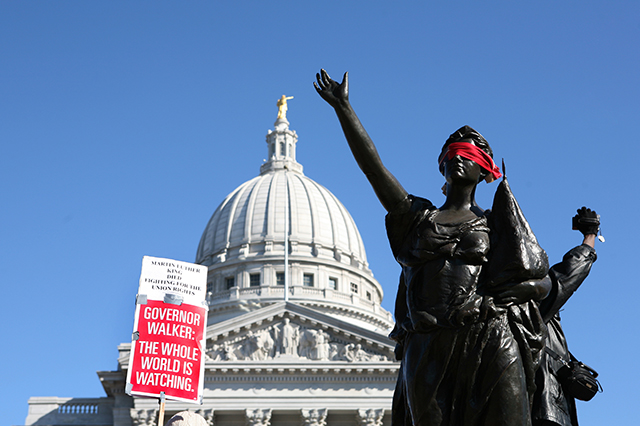
By voting to pass a right-to-work bill, the Wisconsin State Legislature is not advancing the cause of individual freedom, as conservatives argue, but is, instead, turning back the clock on labor rights to the 19th century.
In March 2011, Republican lawmakers passed a similar measure for public employees known as Act 10 (Wisconsin State Journal, March 13). In addition to restricting collective bargaining to wages, the law permits state workers “to refrain from paying dues while remaining a member of a collective bargaining unit.”
Conservative lawmakers announced on February 20, 2015 that they would push or “fast track” a right-to-work bill for private sector workers in a matter of days.
On Friday, in a party-line vote, the state Assembly passed the bill 62-35, sending it to Governor Walker for his promised signature. On February 25, the state Senate voted for it, 17-15, electing to transform this longtime labor stronghold into an anti-labor regime, reminiscent of Gilded Age America.
Back in those days, lawmakers of both major parties said that union contracts bound bosses and workers to a common set of wages and working conditions, and in doing so unjustly prohibited individual employers from cutting side deals with individual workers. Instead of viewing unions as a collective route to a better life, 19th century lawmakers sought to portray unions as dangerous conspiracies that subverted individual rights. In response, politicians passed “conspiracy laws” to protect the employees’ “right to work” on whatever terms they saw fit.
A similarly misleading individualism inspires contemporary rhetoric. For example, Wisconsin state representative Tyler August (R-Lake Geneva) said in a recent statement, “I believe the right-to-work issue is about workplace freedom. Workers should have the freedom to choose whether or not it is in their family’s best interest to join a union.”
State Senate majority leader Scott Fitzgerald (R-Juneau), who authored the bill, echoed August, saying, “This issue, at its heart, is about worker freedom.”
Now one might ask, “Shouldn’t workers have a choice?” The problem is that choice is a red herring, a distraction from what is really a right-wing power play. Wisconsin workers already had the choice to join a union or not, but even nonmembers paid a small service fee because unions were legally bound to organize and represent everyone in workplace grievances and contract negotiations. This is called “fair share.”
By giving private sector workers the “choice” to pay dues or pay nothing at all, Fitzgerald and August are attempting to deprive all workers, both public and private, of the organizational resources needed to pressure recalcitrant employers into paying a living wage. Conservative lawmakers are not protecting workers as individuals – they are disempowering workers as a class.
Current Population Survey (CPS) data suggest that Wisconsin public sector union membership fell sharply from 35.8 percent in 2013 to 30.9 percent in 2014, the third full year since the passage of Act 10. That’s a loss of nearly 15,000 dues-paying members out of a total membership of 138,000 in just 12 months. The right-to-work law would have a similar effect on private sector unions, who represent nearly 60 percent of all Wisconsin workers.
The impact on workers and their organizations is not only monetary. Present-day conspiracy laws also undercut collective action. If workers don’t pay dues, they’re not likely to make other sacrifices for the benefit of their coworkers like signing a petition, attending a rally or walking a picket line.
Wisconsin’s right-to-work law is about recreating the 19th century social order, when the working class was thwarted at every turn in its bid to challenge economic inequality under capitalism. The state legislature just made it possible to turn back the hands of time.
Join us in defending the truth before it’s too late
The future of independent journalism is uncertain, and the consequences of losing it are too grave to ignore. To ensure Truthout remains safe, strong, and free, we need to raise $46,000 in the next 7 days. Every dollar raised goes directly toward the costs of producing news you can trust.
Please give what you can — because by supporting us with a tax-deductible donation, you’re not just preserving a source of news, you’re helping to safeguard what’s left of our democracy.